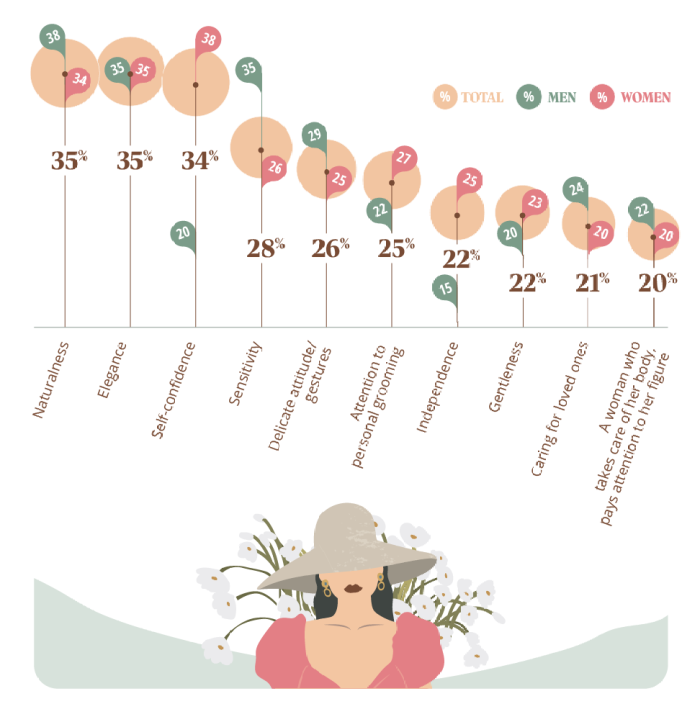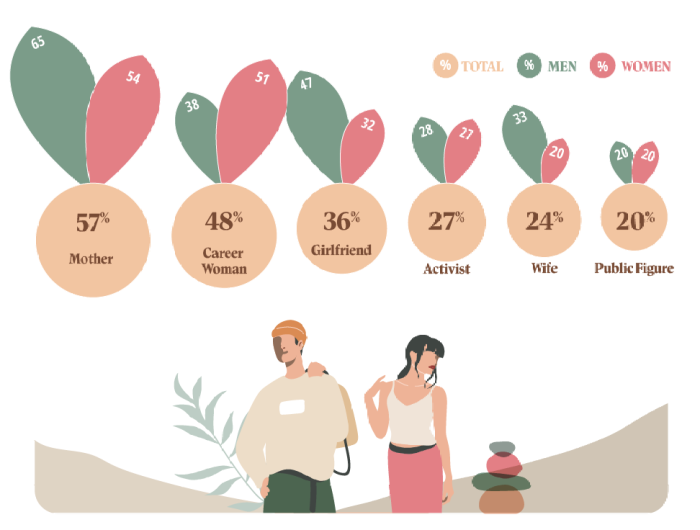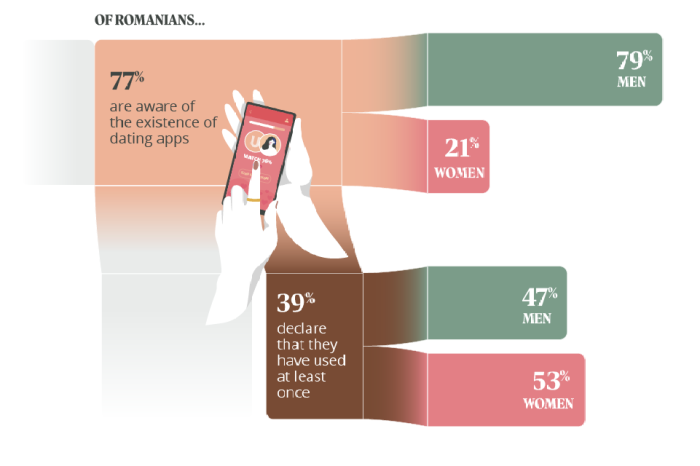Exploring femininity in Romanian culture
Physical appearance is perhaps the first thing that draws our attention when we meet someone, and even though we often emphasize our features, Romanians believe that femininity is rather determined by the behavior and values that a woman promotes. 9 out of 10 Romanians claim that femininity is ageless.
Thus, naturalness, elegance, and self-confidence are qualities that sustain femininity today, both among women and men. However, there is a recent trend for women to associate femininity with characteristics such as independence and power, which not long ago were more associated with men. This fact is partially contradictory to men’s associations linking femininity to sensitivity, delicacy, and the need for protection.
Although most Romanians have stated that femininity is not exclusively defined by physical attributes, features, and fashion style are not completely ignored: men perceive a woman as more feminine to a greater extent based on these two considerations.
57% of Romanians associate femininity with the “mother’s role”
More than half of Romanians make the connection between femininity and the maternal role, and this association is more pronounced among men (54% women vs. 65% men). On the other hand, women associate femininity, to a greater extent, with a career woman (51% women vs. 38% men), demonstrating their need to be independent and not remain anchored solely in traditional roles such as mother, life partner, or homemaker.
The romantic role is often associated in society with femininity, especially by men, reflecting the importance of relationships and partnerships as landmarks in the development and expression of feminine identity.
Analyzing specifically the roles of mother, girlfriend, and wife, we observed that these are rather associations made by men, reflecting the traditional social expectation for women to be partners and supporters of household and family.
Norms and expectations: How are women perceived in the context of relationships?
Women associate femininity both with the “role of mother” and “career woman” – there is an expectation that they should be willing to make sacrifices in their careers to primarily dedicate themselves to the family.
32% of Romanians expect women to give up their jobs to take care of children or elderly family members. One in three Romanians believes that women should prioritize family over career. Additionally, 32% state that household chores, such as cleaning and cooking, are women’s responsibility (30% women vs. 36% men).
Traditionally, the distribution of household tasks has been divided, with most women primarily responsible for household chores and childcare, while men handle financial aspects such as decision-making and necessary payments. However, perspectives are changing, and most parents of Alpha children believe that responsibility for their care does not fall solely on the mother.
Regarding the relationship between partners, there is a predominant perception that financial responsibilities should be equally shared, supported by 67% of Romanians. Additionally, 56% of respondents believe that women are better at managing the family budget. However, 41% of respondents consider the man to be the leader of the family.
Perspectives on marriage and happiness in relationships vary – about half of Romanians declare that in a couple, all activities should be done together, and 45% consider that a true family is represented by the married couple with at least one child. However, 59% of Romanians agree that not all women want to have children, but it is important to recognise that this subject remains controversial. The preconceived notion persists that women desire marriage more than men, but it’s important to consider that women are subjected to greater social pressure regarding marriage.
Challenges and perceptions faced by women in the workplace
Over time, women have demonstrated that they can do it all, yet there is still the perception that those who dedicate themselves to their careers will automatically neglect their families (27% women vs. 42% men).
Approximately half of women (49%) face difficulties in balancing their professional and personal lives, while 39% feel that they lack access to career advancement opportunities. Additionally, one in three women has noticed a lack of female representation in leadership positions or in important decisions, and gender-based discrimination remains a significant issue (29%).
22% of women state that they feel undervalued or are assigned smaller responsibilities than their male colleagues, while 17% have experienced sexual harassment or gender-based harassment in the workplace. These findings underline the need for clear policies and practices to promote a safe, fair, and inclusive work environment for all employees.
 All Publicis Groupe Romania proprietary data tools in one place.
All Publicis Groupe Romania proprietary data tools in one place.Discover the power of our tools and feel free to get in touch.











